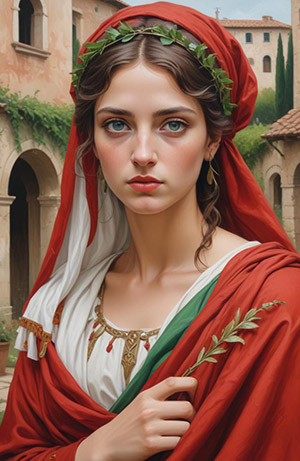Hestia is the virgin goddess of the hearth and the home. As the goddess of the family hearth she also presides over the preparation of meals. Hestia is also the goddess of the sacrificial flame and received a share of every sacrifice to the gods. The cooking of the communal feast of sacrificial meat was naturally a part of her domain. Vesta was the Roman equivalent to Hestia.
Hestia, for the most part, chooses not to get involved in the quarrels, politics, and escapades of the other Olympian deities. Instead, she is content with her position as a house deity, worshiped with simple sacrifices by simple people on tiny home altars.
Hestia's clerics are usually common people, and often farm the land or carry on a trade in addition to organizing worship of Hestia. Her clerics bless new homes, consecrate the hearth altars found in nearly every home, and share in family celebrations such as births, birthdays, and other rites of passage.
Temples
Hestia has no temples of her own, but she has a place of honor in every Olympian temple. Every hearth fire that burns in temples and in homes is an altar to Hestia, and so her honor is high indeed despite her low rank in the pantheon.
Hestia's faith is a simple one. She teaches the virtues of home and family life, the sweet rewards of labor, and the blessings of food and rest. She encourages common people to take pleasure in the gifts of life as they come, giving thanks to the gods for every earthly blessing.
Hestia appears as a modestly veiled, young woman with a gleam in her eyes like dancing firelight. She sometimes holds a flowered branch (chaste-tree)
She is the firstborn daughter of Cronus and Rhea, but was the last to emerge from her father's stomach when Zeus liberated his swallowed siblings. Poseidon and Apollo both courted her, but she spurned them both and swore an oath to remain a virgin for ever.

